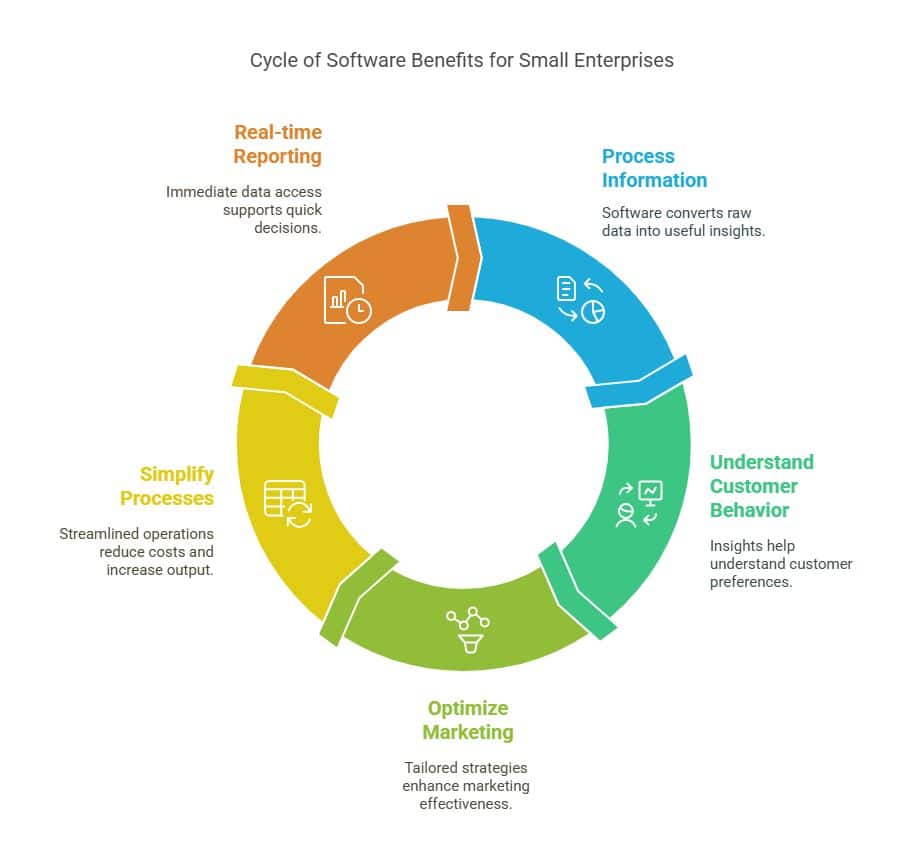
Why Choose Analytics Tools for Small Business Growth?
Choosing analytics tools for small business growth is crucial for transforming raw data into strategic insights.The tools show customer patterns & improve business processes aiding decision-making. They drive targeted marketing strategies and improve operational efficiency by highlighting inefficiencies. Real-time data analysis enables dynamic adjustments, fostering competitiveness. Additionally, monitoring financial performance and market trends guides sustainable scalability and innovation. By deepening the understanding of customer behavior, businesses can foster engagement and loyalty. Overall, analytics tools empower small businesses to anticipate market shifts and capitalize on opportunities. Exploring the specific benefits can further illuminate their critical role in growth strategies.
Key Takeaways
- Software programs process unrefined information into practical understanding. This aids decision-making & supports growth for small enterprises.
- They help understand customer behavior, leading to personalized marketing and enhanced customer experiences.
- Optimizing marketing strategies with data-driven insights increases efficiency and return on investment.
- Using data analysis to simplify processes cuts expenses and boosts overall output.
- Real-time reporting provides immediate access to data for swift, informed decision-making.

Enhance Decision Making

Data analysis is a strong tool that greatly improves decision-making for small companies. Nowadays the capacity to utilize data analysis is vital for gaining an edge over competitors and promoting expansion. With the availability of advanced data analytics tools, small businesses can now transform raw data into actionable insights, enabling them to make informed decisions that drive success.
Businesses examine customer information. This process allows them to spot important patterns likes, and actions. Knowing these details helps companies adjust their offerings properly. This targeted approach not only improves customer satisfaction but also increases the likelihood of repeat business, ultimately boosting revenue.
Moreover, data analytics tools provide businesses with the ability to assess market conditions and predict future trends, allowing them to adapt their strategies proactively.
For small businesses, the ability to make informed decisions is paramount, given the limited resources and high stakes involved. Data analytics helps small businesses optimize their operations by identifying inefficiencies and suggesting areas for improvement. For example, by examining sales patterns, businesses can adjust inventory levels to meet demand without overstocking, thereby reducing costs and increasing profitability.
Furthermore, leveraging data analytics can enhance competitive positioning. By understanding the strengths and weaknesses of their competitors, small businesses can tailor their strategies to capitalize on market opportunities and mitigate potential threats.
Understand Customer Behavior

Building upon the enhanced decision-making capabilities that data analytics provides, understanding customer behavior emerges as a key focus for small businesses aiming to refine their market strategies. By leveraging the power of data, businesses can gain comprehensive insights into customer preferences, purchasing patterns, and engagement levels. This understanding is crucial for tailoring offerings that resonate with the target audience and foster lasting customer relationships.
The process begins with the collection and analysis of customer data. Utilizing business analytics, small businesses can dissect vast amounts of data to identify trends and patterns that may not be immediately visible. This data-driven approach allows entrepreneurs to make informed predictions and strategic decisions that align with customer needs.
Consider the following table that illustrates the potential insights derived from customer data:
| Insight Type | Description |
| Purchase Patterns | Identifies frequency and timing of purchases |
| Customer Preferences | Highlights favored products or services |
| Engagement Metrics | Measures interaction across channels |
Understanding these insights empowers businesses to customize their offerings and improve customer experiences. For instance, recognizing purchase patterns can help in optimizing inventory and managing supply chains efficiently. Similarly, identifying customer preferences enables personalized marketing efforts, ensuring that promotions and recommendations are relevant and appealing.
Data analytics for small businesses thus acts as a bridge between raw customer data and actionable business strategies. It enables entrepreneurs to not only understand customer behavior but also anticipate future trends. This proactive approach ensures that businesses remain competitive and customer-centric in an ever-evolving market landscape. By continuously refining their understanding of customer behavior, businesses can foster loyalty and drive sustainable growth.
Optimize Marketing Strategies
To optimize marketing strategies effectively, small businesses must leverage the insights gained from data analytics to create targeted and efficient campaigns. By harnessing the power of data analytics, small businesses can gain a deeper understanding of customer preferences and behavior, enabling them to tailor their marketing efforts with precision. This approach not only maximizes the return on investment but also ensures that marketing messages resonate with the intended audience, thereby increasing engagement and conversion rates.
One powerful tool for small businesses in this regard is Google Analytics. By using Google Analytics, businesses can track website traffic, understand user demographics, and monitor customer interactions. This data provides invaluable insights into which marketing channels are driving the most traffic and conversions, allowing businesses to allocate resources more effectively.
Moreover, it enables the identification of high-performing content and the optimization of underperforming areas, ensuring that marketing strategies are continually refined and improved.
In addition to understanding web traffic, data analytics can help small businesses optimize their marketing strategies by assessing the effectiveness of various campaigns across different platforms. For instance, by analyzing social media engagement metrics, businesses can determine which content resonates best with their audience and adjust their strategies accordingly.
This data-driven approach empowers businesses to make informed decisions, reducing guesswork and enhancing the overall efficiency of marketing efforts.
Improve Operational Efficiency

Operational efficiency is a critical driver of success for small businesses, as it directly impacts productivity and profitability. By incorporating small business analytics, companies can streamline their operations, reduce waste, and enhance overall efficiency. The key lies in how effectively businesses can leverage data to identify bottlenecks, redundancies, and opportunities for improvement within their processes.
The benefits of data analytics extend beyond mere number crunching; they enable businesses to make informed decisions that enhance performance. For instance, data analytics for your business can reveal patterns in supply chain operations, facilitating better inventory management and reducing excess stock. This not only cuts costs but also ensures that resources are allocated optimally, maintaining a balance between supply and demand.
Moreover, companies that leverage data can improve operational efficiency by automating routine tasks. Automation reduces the time spent on repetitive tasks, freeing up employees to focus on more strategic activities that add value to the business. This shift not only boosts productivity but also increases employee satisfaction and retention.
Data analytics also play a crucial role in monitoring and enhancing customer service. By analyzing customer interactions and feedback, businesses can identify areas for improvement in their service delivery, resulting in better customer experiences and loyalty. This is particularly important for small businesses aiming to establish a strong market presence.
Monitor Financial Performance

As small businesses enhance operational efficiency through data analytics, an equally important aspect to consider is monitoring financial performance. This vital component involves evaluating financial health through systematic analysis of business data. By leveraging data analysis, businesses can gain insights that help them understand their financial standing, enabling more informed decision-making. In today’s competitive environment, maintaining a keen eye on financial metrics is crucial for ensuring sustainability and growth.
Monitoring financial performance involves the examination of various financial indicators such as revenue, expenses, profit margins, and cash flow. These metrics, when analyzed effectively, provide a comprehensive picture of business performance. Data analytics tools can assist in this process by automating data collection and providing real-time insights. This allows business owners to identify potential financial challenges early, facilitating timely interventions and strategic adjustments.
Furthermore, data analysis helps businesses understand not only where they stand financially but also how they can improve. By identifying patterns and trends within financial data, businesses can uncover opportunities for cost reduction, revenue enhancement, and resource optimization. This proactive approach to financial management can lead to improved profitability and operational resilience.
For small businesses, the ability to monitor financial performance with precision is a powerful advantage. It opens doors to more strategic planning and resource allocation, ensuring that every financial decision is backed by solid data-driven insights.
Identify Market Trends

Understanding market trends is pivotal for small businesses aiming to stay competitive and relevant in their industry. In a rapidly changing marketplace, the ability to identify market trends can provide a significant competitive edge. By leveraging small business data analytics, companies can gain insights into consumer behavior, emerging industry patterns, and potential opportunities for expansion. Data analytics can help businesses sift through vast amounts of information to highlight trends that might otherwise go unnoticed.
The utilization of data analytics tools allows small businesses to move beyond intuition-based decision-making. Instead, they can make informed choices grounded in concrete evidence. These tools can analyze sales data, customer feedback, and social media activity, among other sources, to generate comprehensive reports on current market dynamics. By doing so, businesses can identify which products or services are gaining traction and which may require reevaluation.
Moreover, small business data analytics can reveal shifts in consumer preferences, enabling businesses to adapt their offerings accordingly. For instance, detecting an increase in demand for sustainable products can prompt a company to adjust its inventory or marketing strategies to align with consumer interest.
This proactive approach facilitated by data analytics can significantly contribute to business growth.
Boost Customer Engagement

Identifying market trends is just the beginning of leveraging data analytics for small business success. Once these trends are understood, businesses can pivot towards enhancing customer engagement—a critical component for growth. By utilizing analytics tools, small businesses can effectively boost customer engagement through targeted strategies that cater to specific consumer behaviors and preferences.
Analytics can help identify key patterns and insights from the data to analyze, enabling businesses to tailor their marketing efforts and communication strategies. For instance, by collecting customer data, companies can discern which products or services are most popular, which in turn allows them to focus their efforts on promoting items that already resonate well with their customer base.
Additionally, understanding the frequency and timing of purchases can guide businesses in developing personalized promotions and offers, thereby fostering a stronger connection with their audience.
Moreover, data analytics allows for real-time feedback collection, enabling small businesses to promptly address any issues or concerns raised by customers. This proactive approach not only boosts customer engagement but also builds trust and loyalty, as clients feel their voices are heard and valued.
Furthermore, by analyzing customer interaction data, businesses can refine their user experience on digital platforms, ensuring seamless navigation and satisfaction.
Increase Competitive Advantage

With data analytics at their disposal, small businesses can significantly increase their competitive advantage in the marketplace. By harnessing the power of data analytics, small business owners are equipped to make informed decisions that can set them apart from their competitors. Through the strategic use of data insights, these businesses can identify trends, optimize operations, and better understand customer preferences.
Small businesses can leverage data analytics in the following ways:
- Market Intelligence: By analyzing customer data, businesses can identify emerging trends and shifts in consumer behavior. This insight enables them to anticipate market needs and adjust their strategies accordingly, ensuring they stay ahead of the competition.
- Operational Efficiency: Data analytics helps in streamlining processes and identifying areas where resources can be better allocated. By optimizing operations, small businesses can reduce costs, increase productivity, and enhance overall performance, thus solidifying their market position.
- Risk Mitigation: With robust data analytics tools, small business owners can forecast potential risks and implement strategies to mitigate them. This proactive approach allows for better risk management and ensures business continuity in the face of challenges.
Furthermore, leveraging data analytics also means prioritizing data security. Protecting sensitive information not only builds customer trust but also safeguards the business’s competitive edge.
Facilitate Real-Time Reporting

Real-time reporting serves as a vital component in the landscape of data analytics for small businesses. By enabling immediate access to critical data, small business owners can make informed decisions swiftly and effectively. Analytics can provide the essential framework to facilitate real-time reporting, allowing companies to harness the power of current data. This immediacy in reporting transforms raw data into actionable insights, empowering businesses to adjust strategies and operations on the fly.
Data analytics can provide small businesses with the tools required to monitor key performance indicators (KPIs) as they happen. This capability is crucial for identifying trends, optimizing operations, and responding to market changes without delay. By leveraging analytics to facilitate real-time reporting, businesses gain an edge in agility and responsiveness, which is vital in today’s fast-paced business environment.
Moreover, real-time data analytics can provide small business owners with the ability to determine the effectiveness of marketing campaigns, inventory management, and customer service initiatives instantaneously. This constant flow of information helps businesses to pinpoint areas needing improvement and capitalize on successful strategies. Utilizing real-time data to determine these factors can greatly enhance operational efficiency and profitability.
In addition, analytics can provide insights into customer behavior and preferences, which are invaluable for tailoring products and services to meet consumer demands. By facilitating real-time reporting, businesses are better equipped to engage with their audience in a personalized and timely manner.
Ultimately, the capacity for real-time analytics not only helps businesses stay competitive but also fosters a culture of continuous improvement and innovation.
Support Business Scalability
A robust data analytics framework can significantly bolster business scalability, enabling small businesses to efficiently expand their operations. When businesses can leverage data analytics effectively, they not only enhance their decision-making processes but also optimize their resources and operational efficiency. Analytics tools play a crucial role in this transformation by offering insights that are pivotal for growth.
To grow your business, it is essential to understand how data analytics can be a catalyst for scalability:
- Resource Optimization: Utilizing analytics tools allows businesses to manage resources more effectively. By analyzing data, companies can identify areas where resources are underutilized and reallocate them to where they are most needed. This leads to improved productivity and reduced waste.
- Customer Insights: Data analytics provides valuable insights into customer behavior and preferences. By understanding these patterns, businesses can tailor their offerings to meet customer demands, thereby enhancing customer satisfaction and loyalty, which are critical factors for scaling operations.
- Market Trends Analysis: A data analytics consultant can assist businesses in interpreting complex data sets that reveal market trends. By staying ahead of market changes, businesses can adapt quickly and gain a competitive edge, ensuring sustained growth and scalability.
Incorporating data to make informed decisions is fundamental in today’s business landscape. As small businesses seek to grow, leveraging the power of analytics tools becomes indispensable.
Final Thoughts
Utilizing analytics tools is essential for small business growth, as they transform data into actionable insights that enhance decision-making and operational efficiency. By understanding customer behavior and optimizing marketing strategies, businesses can drive engagement and loyalty while adapting to market trends. Real-time reporting and robust data analysis not only foster responsiveness but also support scalability, enabling businesses to allocate resources effectively and innovate continually.
Ready to unlock the full potential of data analytics for your small business? Connect with Syville Gacutan, an experienced SEO Specialist in the Philippines. Get personalized insights, expert strategies, and hands-on support to drive growth, optimize operations, and stay competitive. Let’s transform your data into success—reach out today!